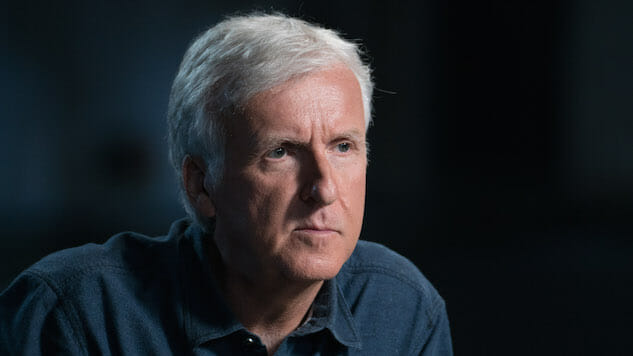Documentary shows, especially the kind that decide to eschew formal creativity for prestigious gets in terms of content or delivery (the fun, exclusive info delivered by big names that you love), are best judged by their relationship with the source material. James Cameron’s Story of Science Fiction loves its genre with every second of its six-episode run.
The format is standard: talking heads complimenting footage from films spanning the decades from the 1950s until the last few years, with a few behind-the-scenes pictures and stock clips of departed artists or thinkers digging a little deeper into what we all came for, which is the relationship between the science fiction, those behind it, and their peers.
Sometimes Cameron and one of his groundbreaking buddies (Steven Spielberg, George Lucas, Guillermo del Toro, etc.) will stop by for a brief one-on-one discussion about their fascinations. Each episode focuses on one aspect of sci-fi that’s captured the imagination of the movies. Aliens, monsters, AI, the future, time travel, and deep space—all things with the potential to upend what we understand as human life. They are the most important nouns in the genre, what “who, what, where, when, how, and why” are to journalism. I’m not saying you have to have all of them to be good science fiction, just that each one helps us understand a different facet of human society. Together, the guests of the series argue, they help unfurl something about our species that has remained tightly bundled in our history, tucked away and disguised as myth or folktale.
Providing historical context and psychological asterisks for all your favorite sci-fi movies (and the inspired pairings of films like Independence Day and Close Encounters of the Third Kind) make the docuseries more than the sum of its interviews with all your geeky favorites. It becomes a guidebook and a support group to those for whom genre is simply the way they experience and translate life. We all might be exhausted with the “explain national politics with SpongeBob characters” style of essay, but when you consider that a larger segment of the population would rather not have anything explained to them at all, finding a common language—be it chockablock with aliens or not—is vital.
But it’s not always equally invigorating. If you’re a casual sci-fi fan, you’ll celebrate seeing your favorites discussed with a grade of nuance sharper than adulation. If you’re a hardcore nerd, you might be more difficult to impress: This Story of Science Fiction is decidedly mainstream. You won’t find references to more esoteric traditions (when James Gunn shows up, it’s as the director of Guardians of the Galaxy, not the founding director of the Center for the Study of Science Fiction). Rather, the focus is on blockbusters and their historical reference points. Those raised on the popcorn will appreciate the kernels for their magic, but those who’ve done their extra credit homework won’t find much here but a glimpse at a few of the seeds that got them excited about the genre in the first place.
We learn the tear-jerking origins of details like the comforting movement of E.T.’s fingers during his final goodbye to Elliott, or the motives behind the Arrival aliens’ alternate cognition. Even for the thoroughly well-versed, the show has the same entertainment value as those shows on The History Channel that provide big-haired pseudoscientists the chance to preen about extraterrestrials while grounding all the larger-than-life figures they have speaking in these crackpots’ stead. By showing that so many of us love these movies, and for similar reasons, the series humanizes grandiose figures with talk of spaceships and pod people. The diverse group of interviewees aids in this: For every Will Smith, there’s a Dr. Blair Davis (who, full disclosure, I worked for as a graduate assistant) or a Nnedi Okorafor. Scholars of sci-fi history and contemporary creators in the genre reveal the fandom and introspection at every level of the sci-fi supply chain. The creators give to the consumers, who become the analyzers, which leads to a new group of creators.
This life cycle of knowledge and creativity is a beautiful thing, documented as a simple appreciation of a genre. It also feels like auditing a college class on the genre, thanks to everyone’s (not just the critics’ and academics’) willingness to offer up history and psycho-social theories on their favorites. The Story of Science Fiction may be idealistic and romantic about its genre, which may only be right for one that’s spawned fandom as a modern concept, but its excitement is contagious and its grounding of larger-than-life ideas (even if these ideas are sci-fi stars and creators themselves) makes it more than worthy of being the genre’s video encyclopedia.
James Cameron’s Story of Science Fiction premieres tonight at 10 p.m. on AMC.
Jacob Oller is a writer and film critic whose writing has appeared in The Guardian, Playboy, Roger Ebert, Film School Rejects, Chicagoist, Vague Visages,
and other publications. He lives in Chicago, plays Dungeons and Dragons, and struggles not to kill his two cats daily. You can follow him on Twitter here: @jacoboller.